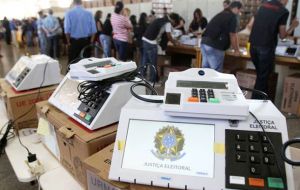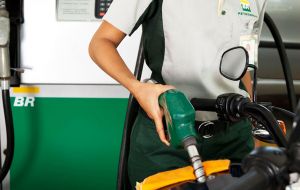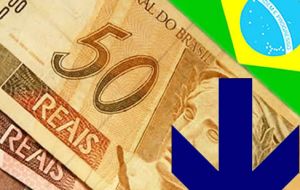MercoPress. South Atlantic News Agency
Investors on edge waiting for the results of Sunday's voting in Brazil
 The results on Sunday should be quick in coming since Brazil has implemented a network of electronic balloting with 507.000 voting machines
The results on Sunday should be quick in coming since Brazil has implemented a network of electronic balloting with 507.000 voting machines  Whatever the results one thing is for sure: fuel prices, frozen by Petrobras for several years, will increase when the election is over
Whatever the results one thing is for sure: fuel prices, frozen by Petrobras for several years, will increase when the election is over  On Friday the local currency Real dropped to 2.5 to the dollar, its lowest since December 2008, but later pulled back
On Friday the local currency Real dropped to 2.5 to the dollar, its lowest since December 2008, but later pulled back Latin American currencies weakened on Friday after strong U.S. jobs data was seen as increasing the likelihood of higher interest rates in the world's largest economy, while Brazil markets fluttered in the last trading session before Oct. 5 elections.
Data on Friday showed U.S. jobless rate fell to a six-year low and the rosy data bolstered bets that the U.S. Federal Reserve would hike interest rates in mid-2015, fueling demand for the dollar and sinking riskier currencies.
The Chilean, Colombian and Mexican pesos all fell about 0.5% against the dollar. Brazil's real fluctuated through most of the session, at one point weakening past the closely-watched level of 2.5 per dollar for the first time since December 2008 before pulling back in the afternoon.
Investors have been on edge for weeks as Brazilian electoral polls shifted the outlook for the country's presidential race on Sunday. Two new polls released late Thursday showed President Dilma Rousseff widening her lead over challengers.
The real tends to weaken when polls show Rousseff gaining as many investors believe a more market-friendly administration could help boost demand for Brazilian assets.
The region's stocks were mostly higher, driven by the improving outlook for global economic growth following the U.S. data and bargain-hunting after a recent slump. The MSCI Latin American stock index was up about 1.2% after touching its lowest point in six months on Thursday.
Brazil's Bovespa stock index rebounded for the second day in a row, rising 1.6% led by a near 6% in preferred shares of state-run oil producer Petrobras. The company saw its shares take a beating over the last month as Rousseff gained in the polls. In fact, September's fall of 22.5% was the stock's worst monthly performance since October 2008, at the height of the global financial crisis.
Investors in Petrobras have lambasted the Rousseff government for forcing the company to import fuel at global prices and sell it at a loss in the domestic market as a way to tamp down inflation. Whatever the results of the presidential election, fuels prices are expected to rise significantly.
On Sunday 142.8 million Brazilians are registered to vote, with Sao Paulo, (31.9m); Minas Gerais (15.2m); Rio do Janeiro (12.1m); Bahia (10m) and Rio Grande do Sul (8.4m) the most important of 27 states.
Voting is compulsory in Brazil, although the norm does not apply to those aged between 16 and 18, and over 70.
On Sunday Brazilians will elect the president (2015/2019); 27 state governors; 513 members of the Lower House and 27 out of 81 Senators (renews by thirds) plus 1.059 state lawmakers. Brazil was among the first countries to implement the electronic vote and 507.000 machines will be distributed along the country on Sunday. This means the results should be known on the same ballot night.
If the winning presidential candidate does not take 50% of valid ballots, there is a runoff between the two leading hopefuls on 26 October. The winner takes office on January first.
The three leading candidates are the incumbent Dilma Rousseff bidding for re-election and ahead in the polls (but below 50%); environmentalist Marina Silva which has had an erratic performance in vote intention and Aecio Neves, from Brazil's main opposition party.




Top Comments
Disclaimer & comment rules-

-

-

Read all commentshahaha. Speculators are eating the bread through hell!
Oct 04th, 2014 - 02:39 pm 0https://www.youtube.com/watch?v=IDlT2SWNA4g&list=FLmXPTu1f8AdGlizWNiASx2A&index=2
HaHaHa who gives a shit about Brazil
Oct 04th, 2014 - 05:34 pm 0The political use of Petrobras - in that the government has obliged the company to hold down the price of fuel, in order to favour their image - is the cause of the company's financial problems and the reason why its shares are not worth much more than an ass wipe.
Oct 04th, 2014 - 06:53 pm 0To be honest, I'm going to love seeing the price of fuel go through the roof, and screw all the poor idiots who support DumboAss Dilma. I can't wait to see them squirming when they have to fill the tanks of their cars.....serves them bloody right. And, the increase will have a domino effect, far more perverse than just the price of gas at the pump - it will increase the price of public transport (bus fares), trucking costs, grocery bills, and everything that depends on fuel. That will impact the cost of living ...and who will be hardest hit ? the numbnuts who voted for Dilma, just like the moron posting at @1.
And at the same time, the increase in revenue for Petrobrás should make the share value shoot up again.....as far as I'm concerned, a win-win situation.
Commenting for this story is now closed.
If you have a Facebook account, become a fan and comment on our Facebook Page!